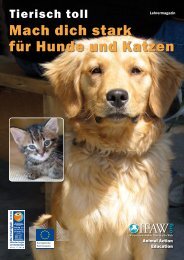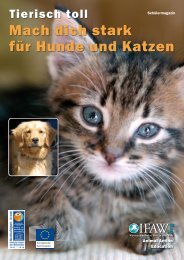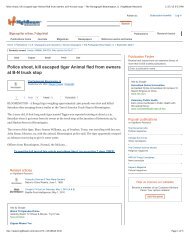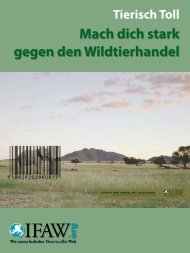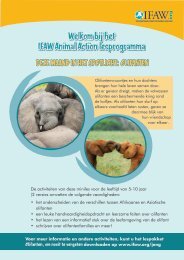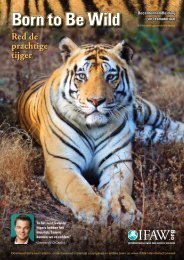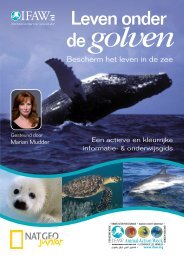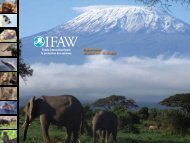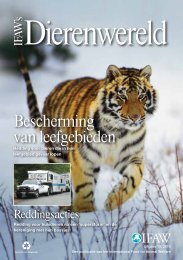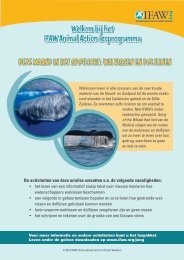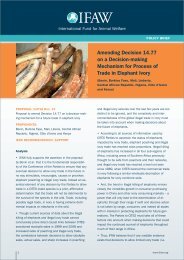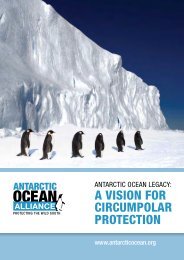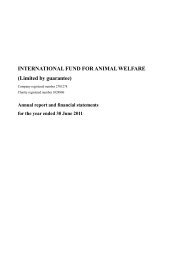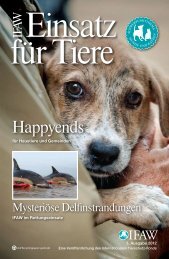leagal aspects of the whale watching.pdf - International Fund for ...
leagal aspects of the whale watching.pdf - International Fund for ...
leagal aspects of the whale watching.pdf - International Fund for ...
Create successful ePaper yourself
Turn your PDF publications into a flip-book with our unique Google optimized e-Paper software.
6.5 Sufficiency <strong>of</strong> <strong>the</strong> IWC’s existing role<br />
The members <strong>of</strong> <strong>the</strong> IWC have recognised <strong>the</strong> need to identify and assess <strong>the</strong> potential impacts <strong>of</strong> <strong>whale</strong> <strong>watching</strong><br />
on cetaceans. The IWC’s Scientific Committee has expertise in <strong>the</strong> scientific <strong>aspects</strong> <strong>of</strong> large and small cetaceans.<br />
However, <strong>the</strong>re is a division <strong>of</strong> opinion within <strong>the</strong> IWC concerning whe<strong>the</strong>r or not under <strong>the</strong> ICRW, it has a mandate<br />
to consider (still less to regulate) <strong>whale</strong> <strong>watching</strong>. IWC Resolution 1996-2, however, notes that <strong>the</strong> IWC has a<br />
continuing part to play in monitoring and providing guidance regarding <strong>the</strong> sustainable development <strong>of</strong> <strong>whale</strong><br />
<strong>watching</strong> activity. Japan takes <strong>the</strong> view that <strong>whale</strong> <strong>watching</strong> is not within <strong>the</strong> IWC’s competence. It regards <strong>the</strong><br />
Convention as primarily concerned with <strong>the</strong> regulation <strong>of</strong> <strong>the</strong> whaling industry. In addition, <strong>the</strong>re are a number <strong>of</strong><br />
o<strong>the</strong>r states which question <strong>the</strong> IWC’s authority to regulate <strong>whale</strong> <strong>watching</strong> on <strong>the</strong> grounds that this activity is<br />
focused in part on small cetaceans which <strong>the</strong>y regard as outside its competence. However, Article VI <strong>of</strong> <strong>the</strong><br />
Convention does allow <strong>the</strong> IWC to make recommendations on any matters relating to <strong>whale</strong>s and whaling.<br />
The IWC’s agreement to consider <strong>whale</strong> <strong>watching</strong> activities resulted in <strong>the</strong> despatch <strong>of</strong> a questionnaire to its<br />
member governments seeking in<strong>for</strong>mation on <strong>the</strong>ir relevant legislation, guidelines and practices. This was later<br />
updated and expanded to include <strong>the</strong> practice <strong>of</strong> non-member states in Carlson’s (1996) review <strong>of</strong> guidelines and<br />
regulations. The IWC’s Scientific Committee has reviewed <strong>the</strong> scientific <strong>aspects</strong> <strong>of</strong> <strong>whale</strong> <strong>watching</strong> and <strong>the</strong> IWC has<br />
agreed that it will look at <strong>the</strong> educational, economic, social and developmental <strong>aspects</strong> <strong>of</strong> <strong>whale</strong> <strong>watching</strong>.<br />
6.6 Need <strong>for</strong> dedicated overview body at national, regional, or international level<br />
It was noted that <strong>the</strong>re are few bodies, apart from <strong>the</strong> limited role now accepted by <strong>the</strong> IWC outlined in section 6.5,<br />
currently involved in overviewing and commenting on <strong>the</strong> development <strong>of</strong> <strong>whale</strong> <strong>watching</strong> legislation and<br />
guidelines. There is clearly a need <strong>for</strong> some kind <strong>of</strong> co-ordinating and advisory service at <strong>the</strong> international and or<br />
national level, possibly ad hoc, to review <strong>the</strong> situation as and when required. One suggestion made was <strong>for</strong> <strong>the</strong><br />
establishment <strong>of</strong> an <strong>International</strong> Whale Watching Commission or Committee (IWWC). The participants considered<br />
whe<strong>the</strong>r any existing organisations might fulfil or be willing to take on this role, <strong>for</strong> example, UNEP through its<br />
Marine Mammal Action Plan, <strong>the</strong> Commission on Environmental Co-operation (CEC) in North America, IUCN (World<br />
Conservation Organisation) or <strong>the</strong> IWC itself. Meanwhile, it was agreed that at least some <strong>for</strong>m <strong>of</strong> regional and<br />
international co-operation is vital to protect those migratory species which are <strong>the</strong> focus <strong>of</strong> <strong>whale</strong> <strong>watching</strong> activities<br />
in various countries during <strong>the</strong>ir migratory route, <strong>for</strong> example, species such as <strong>the</strong> gray and right <strong>whale</strong>, which travel<br />
through waters falling under a variety <strong>of</strong> jurisdictions during <strong>the</strong>ir migrations from feeding to breeding grounds. Cooperation<br />
in such cases, which at present is <strong>of</strong>ten lacking, is vital.<br />
O<strong>the</strong>r precedents <strong>for</strong> <strong>the</strong> establishment <strong>of</strong> an appropriate overview body were considered. One example, <strong>the</strong> Forest<br />
Stewardship Council, might provide a model because <strong>of</strong> <strong>the</strong> emphasis on evaluating, accrediting and monitoring<br />
certifiers, and on streng<strong>the</strong>ning national certification and <strong>for</strong>est management capacity through training, education<br />
and <strong>the</strong> development <strong>of</strong> national certification initiatives. It was suggested that a similar <strong>whale</strong> watch certification<br />
body might be <strong>of</strong> significant value.<br />
In <strong>the</strong> interim, and in <strong>the</strong> absence <strong>of</strong> any kind <strong>of</strong> appropriate body, networks or <strong>for</strong>a <strong>for</strong> communication and<br />
in<strong>for</strong>mation exchange could be established. These could include electronic <strong>for</strong>a <strong>for</strong> development and distribution <strong>of</strong><br />
in<strong>for</strong>mation on <strong>whale</strong> <strong>watching</strong> legislation and guidelines using existing “green” electronic mail networks such as<br />
InfoTerra, ELAN and <strong>the</strong> CECnet. In addition, Internet web pages could be used. There is an existing web site on<br />
<strong>whale</strong> <strong>watching</strong> which is administered from Finland. It incorporates in<strong>for</strong>mation on <strong>whale</strong> <strong>watching</strong> education and<br />
also has some coverage <strong>of</strong> <strong>the</strong> legal <strong>aspects</strong> <strong>of</strong> <strong>whale</strong> <strong>watching</strong>. 2<br />
2 Internet address: Http//blues.helsinki.fi/<strong>whale</strong>/<strong>whale</strong>rul.html. It is hoped that <strong>the</strong> IFAW Workshop reports may eventually be also available on<br />
<strong>the</strong> Internet.<br />
20 Legal Aspects <strong>of</strong> Whale Watching



